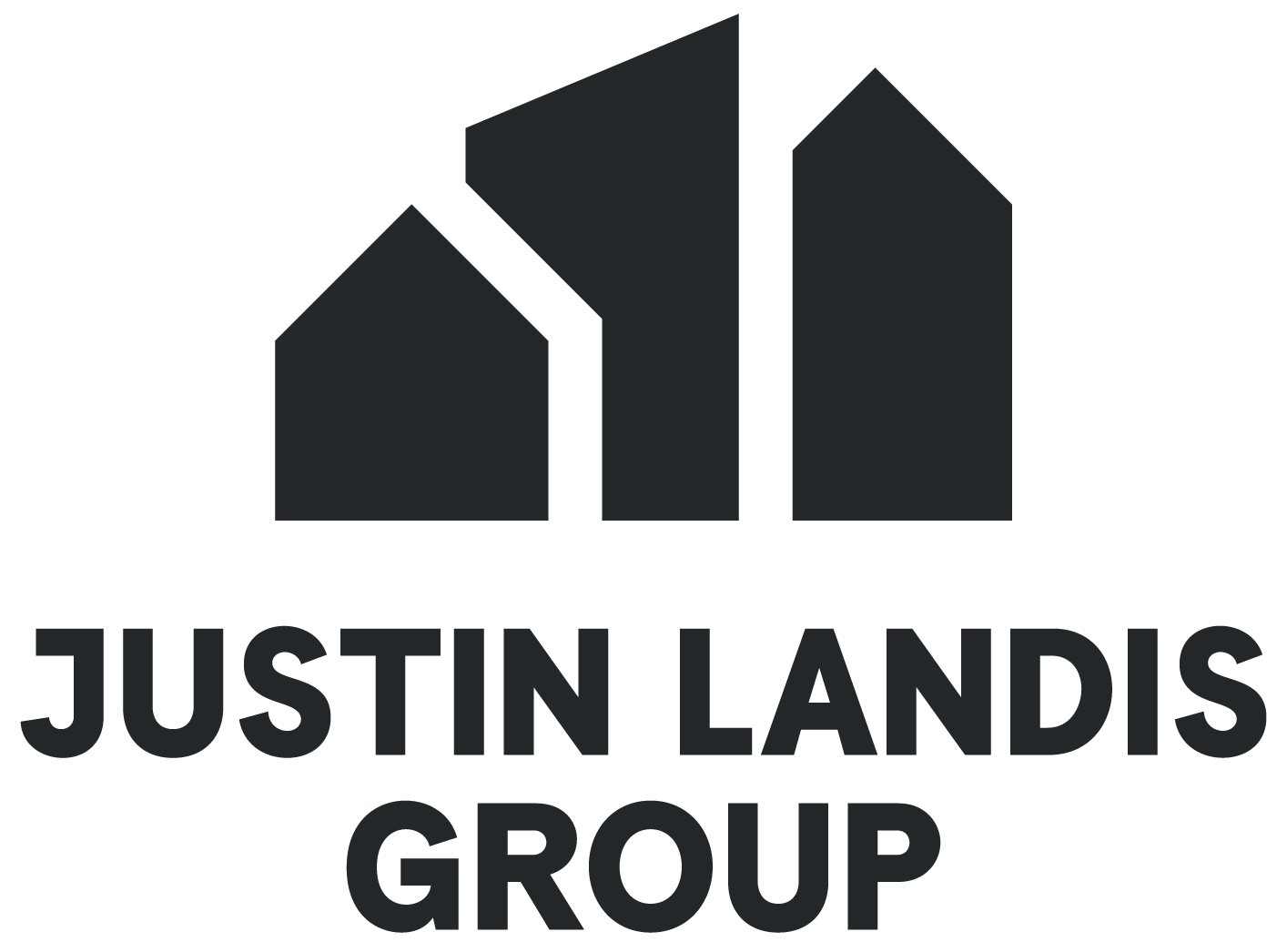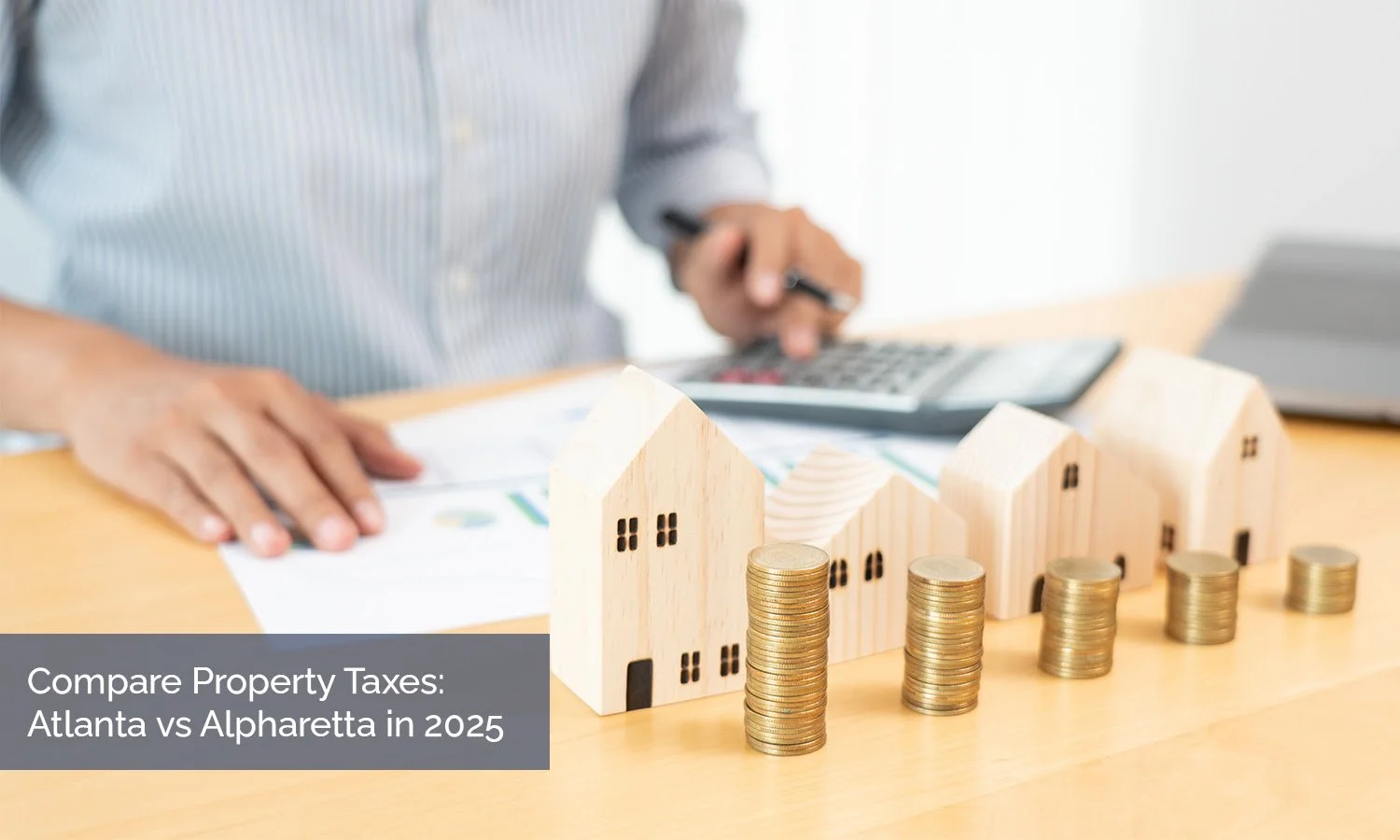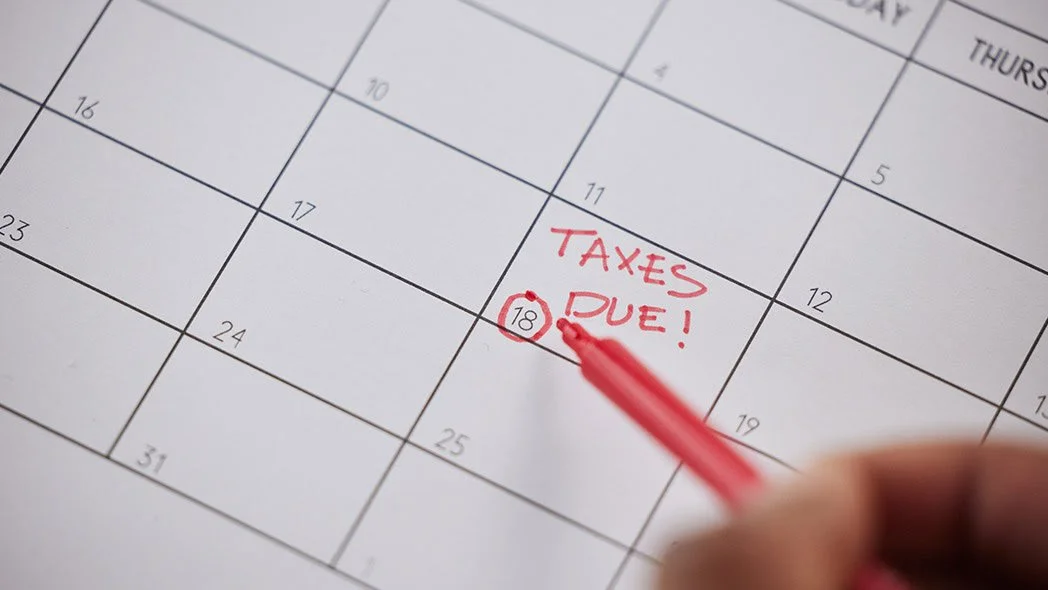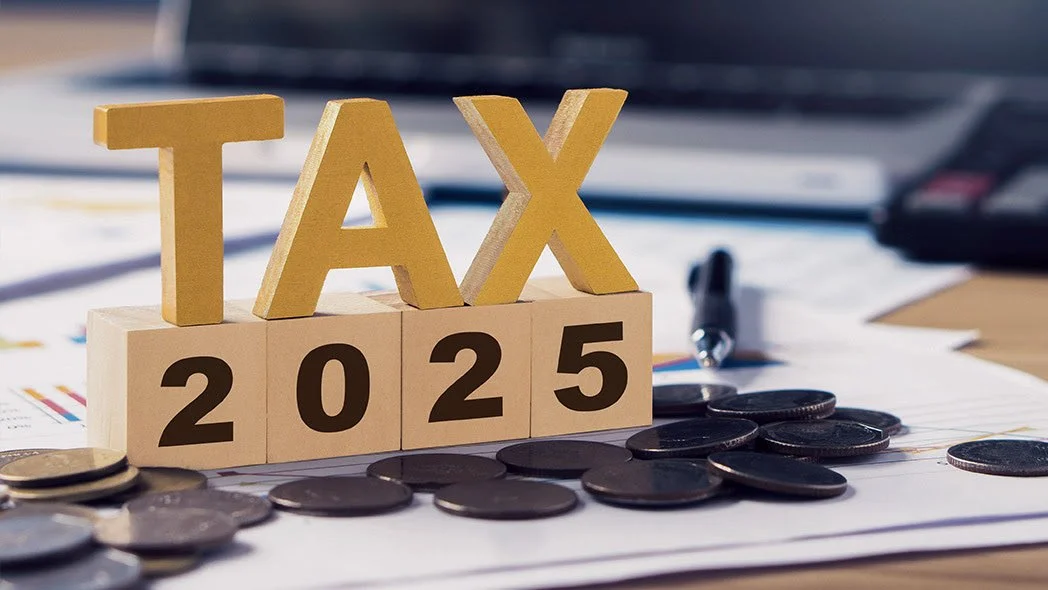Compare Property Taxes: Atlanta vs Alpharetta in 2025
Property taxes in 2025 are going to cost Atlanta and Alpharetta homeowners more than they did last year.
These two cities are part of the same county system. But the way your taxes are calculated is very different between them. The same millage rates cost much more when you compare something like your Old Fourth Ward loft to your neighbor's home in the Windward subdivision. Some homeowners end up saving thousands of dollars just by filling out the right forms, while others pay the full amount. Most people get confused by the paperwork involved.
I'll show you how these cities calculate what you owe and the main deadlines that affect your payment amount. This includes actual numbers you can work with and exemption strategies that many homeowners don't even know about. If you know how the math works, you can keep more money in your bank account.
Here's how Atlanta and Alpharetta calculate what you need to pay!
How Your Home Gets Its Tax Value
Property taxes come down to some pretty basic math. You take your tax rate and multiply it by what your home is assessed at. Most people think about the tax rate part. But the real story is in that second number - your home's assessed value.
Atlanta homes usually run about $400,000, while Alpharetta properties go for around $492,800. That gap alone explains why your neighbor across the county line might pay more than you do, even when you both have the same tax rates. Where you live matters way more for your tax bill than any policy debates you hear about. What your property is worth is what decides how much you pay each year. When there's a $90,000 difference in assessed value, that means you're looking at about $900 more in taxes every year.
Fulton County takes care of everything for the two cities through their mass-appraisal system. They look at three years of sales data from your area to calculate what your property is probably worth. Every year, they'll send you a new assessment that shows what's going on in the market. You have 45 days to appeal if you think they're wrong about your home's value. Those 45 days go by fast, so you need to stay on top of it.
Here's where it gets a bit tough for homeowners. You really want to see your home's value increase - that's how you build wealth. But you probably don't like opening up that assessment letter when it comes in the mail. One Buckhead condo owner showed that appeals could actually work - they lowered their 2023 tax bill by 12% after they challenged their assessment. As a homeowner, you're stuck with this weird situation. Your home going up in value is great for building wealth. But it also means you pay more in taxes every year. Every time your assessed value goes up by $10,000, you'll pay about $100 more per year in taxes.
Where your home is located can make a big difference, even in the same county. An Old Fourth Ward loft might increase in value way faster than a Windward single-family home, and it's all because of what's going on in each neighborhood. If you put in new granite countertops, that'll probably increase your assessment faster than if you replace your roof. That's because buyers pay more attention to pretty kitchens than basic repairs. The cosmetic stuff is what assessors usually see first.
I've seen plenty of homeowners make the mistake of thinking that what Zillow says their home is worth is the same as their taxable value. The county doesn't use the same approach or timing that these online tools do. Zillow uses its own formula that looks at different information than what county assessors use. Those online estimates change all of the time. But official assessments only happen once a year.
What matters for your tax bill is the county's number, not what shows up on real estate websites.
Ways to Save on Your Taxes
Both Atlanta and Alpharetta have a few different options to help you lower your property tax bill. The most basic option is the standard $2,000 homestead exemption that every homeowner can claim. Most people don't know just how easy this process actually is. You just have to file a basic one-page form with your county, and that's all there is to it.
Now, here's what you might not expect. A 2022 state audit showed that nearly 8% of eligible homeowners never got around to filing for their homestead exemption. That mistake cost them hundreds of dollars every year. Imagine finding out you'd been overpaying your taxes for years just because you forgot to submit a form.
Your $2,000 exemption will usually save you about $200 each year on average. That said, Atlanta has some extra help specifically for seniors who live in the area. If you're 65 or older, you might be able to get a $40,000 exemption based on what your income level is. There's also a separate $25,000 city school exemption available for seniors or people who have disabilities. What's great is that the city lets you combine these benefits for even more savings. The city even has what's called a homestead freeze that keeps your tax base locked in at the same level even when your home value goes up over time.
Fulton County has put together its own senior benefit program, too. Residents who are 70 or older and who meet income requirements can get a full exemption on all of their county taxes. While this doesn't cover school taxes, it still represents real savings. Georgia also started giving homeowners a new floating exemption earlier this year. This puts a cap on how much your taxable value can increase each year, limiting it to match whatever the inflation rate is. This protection helps homeowners avoid sudden assessment spikes that can hurt their budgets. Both cities have to follow this law unless their local governments specifically decide to stay out before March 1st.
The main detail you really need to watch out for is that April 1st deadline. If you miss it, you'll be stuck paying full taxes for the entire year with no way to fix it. Also, if you move to a new home, you'll need to reapply for these exemptions in your new location since they don't automatically carry over. That deadline can create some real financial pressure for homeowners. Your exemption applications have to reach the county office by April 1st, or you'll lose out on thousands of dollars in savings.
When and How to Pay Taxes
You know your tax bill amount after exemptions. But now you need to decide when and how you're going to pay it. This part can get confusing really fast because Atlanta and Alpharetta deal with their deadlines in completely different ways. Most homeowners assume all property taxes work the same way everywhere.
Atlanta property owners run into a tough situation with two separate deadlines that catch plenty of people off guard. Your city taxes are due by October 31st, while Fulton County taxes have a completely different deadline of November 15th. Alpharetta makes it much easier with just one December 1st deadline for everything.
Those late fees can really add up faster than you might think. Fulton County charges you 1% per month plus a $5 late fee right from the start. Small late fees turn into big expenses when people forget about that second deadline. That monthly percentage keeps building up and turns into real money over time.
Here's what trips people up the most - your mortgage company might be handling your escrow payments, but they don't always calculate the right amount you need. Sometimes, they send checks to the wrong address, or those e-bill emails you're supposed to get end up in your spam folder. What's even worse is when escrow shortages cause unexpected late payments you never even knew were happening.
Plenty of homeowners get caught completely off guard by escrow shortages every tax season. Your lender tries to estimate what your annual bill will be. However, property assessments can change throughout the year. When your home value goes up higher than anyone expected, your escrow account doesn't have enough money in it. You have to pay the difference yourself while penalties build up on the unpaid amount.
These penalties can get expensive in a hurry. Interest starts building up the day after your due date goes by. When you hit the 120th day, they tack on a 5% penalty that goes up by another 5% every 120 days after that. That penalty can go as high as 20%, which means your tax bill turns into a much bigger problem than it was before.
At least you have plenty of options to pay. You can pay online, send a check by mail, go in person, or use different payment apps.
What Will Shape Your 2025 Tax Bills
A few different factors are going to shape what you pay in property taxes in 2025 if you live in Atlanta or Alpharetta. The biggest one you need to know about is Fulton County's proposed 12.49% increase over the rollback millage rate. When you see that number, it sounds like quite a bit. This all comes from countywide reassessments that show much higher market values than what we saw just a year ago.
But here's where it gets complicated. When property values rise, it doesn't always mean your tax rates will rise in a straightforward way. Sometimes, areas with lots of tech companies like Alpharetta actually end up with lower actual millage rates because the tax base gets much bigger. When properties become more valuable, local governments can bring in the same amount of revenue with lower rates.
This weird math actually works out in your favor more than you might think. When property values increase all across your neighborhood, it makes the total tax base much bigger. Local governments can then bring in the revenue they need with lower rates on each property. So, your own tax bill might stay the same or even go down while your home value goes up.
School bond referenda and infrastructure SPLOST renewals add another layer to all this. These are the measures that voters approve, and they can bump up your total bill even when the base rates stay the same. Keep an eye on your local ballot measures because they have a direct effect on what you'll pay - and most people skip these elections completely. The Microsoft Quarry Yards project gives you a perfect example of how delayed developments can throw off tax planning. When big projects get delayed, it throws off revenue projections and forces local governments to change their plans.
When commercial developments get delayed, they create budget gaps that homeowners usually have to fill. Counties make their budgets based on the business tax revenue they expect from new developments. When those projects don't happen on time, homeowners end up making up the difference through their tax rates. These timing changes can make your annual tax bill rise or fall by several hundred dollars.
You can't expect 2025 to look like 2024 at all. Political pressure to keep increases down is very strong right now, and you're seeing homeowner protest crowds make headlines in the Atlanta Journal-Constitution. With that said, county-level appraisal backlogs and current lawsuits over valuation formulas could create unexpected changes that show up in your tax statements in ways that are hard to predict.
Should You Pick Atlanta for Your Home?
When you look at the tax differences between these two cities, you'll see why so many homeowners have a hard time figuring out where to live. Alpharetta has a slightly lower tax rate. But their property values are usually higher. Atlanta has a slightly higher rate. But you can usually buy homes for less money there. So, when you add it all up, most families end up paying pretty much the same amount each year. Most people find out that their yearly payments are only a few hundred dollars different between the two cities. You don't have to just accept these numbers. You can actually do something about how much you pay.
Your tax bill depends on the decisions you make during the year. Every exemption you claim saves you hundreds of dollars. If you miss deadlines, you'll watch your neighbors pay less while you have to pay more.
You have more control over your tax bill than you might know, and this year gives you new ways to speak up about it. The calendar actually helps you out. You can contest property assessments and claim exemptions. When your town votes on the local budget, you get to have a say in how they spend your tax money. The best way to save your household money depends on your own situation - whether that's contesting your assessment, claiming exemptions, or voting on spending. But when you know what options you have, you're the one making decisions instead of just getting a bill in the mail and having to pay it.
When costs rise, it hits everyone differently, and trying to pay property taxes along with all your other bills can get really hard. Here's some helpful info, though - property re-evaluations usually come out in the middle of the year, so you get another chance to look at everything and change how you handle your situation. These mid-year assessments give you options that most homeowners don't know about. Your property value could have changed since January. When you file appeals during this time, they usually work out because not many people contest their assessments then.
Dealing with property taxes gets much easier when you have local help by your side. Maybe you're thinking about making this great city your new home, where every neighborhood has its own personality, and there's always something interesting happening. You'll probably want someone to help you understand what makes each area unique. That's where Justin Landis Group comes in. Maybe you're looking for a quiet place in the suburbs or a house closer to the busy city streets - our team will help you find just what you're looking for. Get in touch with the Justin Landis Group - we'll help you find your dream home!






